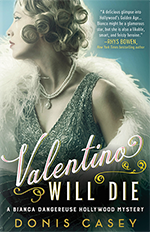Welcome to yet another year, Dear Readers. May this be the best reading/writing year ever. I certainly hold out that hope. I’ve finally finished the first draft of my new book, and have begun the rewrite. We’ve all heard many times that writing is rewriting, and anyone who’s ever scribbled a page knows it’s true. At least I’ve never met a literary Mozart, whose first draft is so perfect that it doesn’t need any alteration. In fact, most authors I know, even very well known and accomplished authors, think of their first drafts as something too embarrassing to be seen by anyone. It’s the rewriting that makes the book. If I may repeat something I’ve written here before – and never let it be said I missed an opportunity to repeat myself – you have to have that block of marble before you can carve out a statue of David.
Rewriting is the fun part, as well. The first draft is eked out of you like bone arrow, but with the rewrites, you have something to play with, to refine, to remodel, to put makeup on and make beautiful. I’ve begun rereading and adjusting, making sure the beginning matches the end. After the first draft, my beginnings never do match the end, for somewhere in the middle of the writing, I changed my mind about this character, or this action, or this story line. And I didn’t waste time by going back to the beginning and fixing it to fit my new vision. No, no, that way lies madness. I can get (and have gotten) caught up in an endless merry-go-round of fixes and never reach the end of a first draft. I just keep going until the MS was done, with every confidence that I can repair all the inconsistencies in the next draft.
As I reread the story, it’s interesting to see how it all turned out, to remember what I originally had in mind and see how the tale changed as I moved through it. Questions come up as I put all my ducks in a row. Here is one I always struggle with: how much explanation is too much?
For instance, there is what looks like a coincidence in one scene of the new book. Coincidences do happen in life, but you’ve got to be very careful about putting one in a mystery story, lest the action seem contrived. And yet, when I set about to explain how this coincidence came about, I didn’t like it. Too much exposition and not enough action.
Do others of you writers out there struggle to find a balance between making it real and making it exciting, or romantic, or terrifying, or however you want it to turn out?
I’ve read and loved many books that elide over illogical plot points. Some best-sellers, too. As long as I like the story and the characters, I don’t really demand existential reality in my reading. Yet I don’t like holes in the plot big enough to drive a truck through. They take me out of the story. Have I done that, or shall I let my coincidence stand and devil take the hindmost? I’ll have to let my pre-readers tell me what they think.
In the meantime, don’t miss my Tell Me Your Story guest starting on Jan 20, the ever-so-fascinating John R. Corrigan, writing as D.A. Keeley, author of the U.S. Customs and Border Protection Agent Peyton Cote series, which is set along the Maine-Canada border.



More Places to Go
Donis on Facebook
Type M for Murder